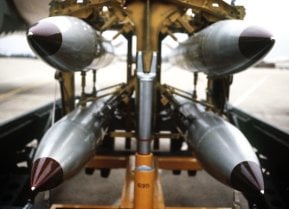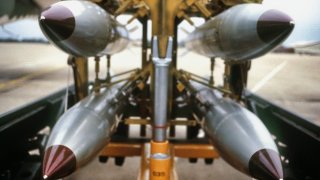Japan Is Destined to Have Nuclear Weapons
“[The Japanese have] a pretty clear view of where they’re going; they’re heading towards becoming a nuclear power in five years.” - Henry Kissinger, April 2023.
Apart from this growing disparity, the larger question for Tokyo is how reliable an ally Washington would be if the dispute developed into a full-scale crisis. Would Americans be willing to shed blood for dots in the ocean they have never heard of? Examples like Ukraine offer no comfort. And it should be remembered that Japan has territorial disagreements with Russia as well. No single dispute may be enough to trigger an all-out war with either China or North Korea (or Russia). But is it time for Japan to consider its own nuclear deterrent to replace the American deterrent and neutralize the salami tactics of its enemies?
Since the end of World War II, there have been two broad foundations to its “nuclear allergy” —and both have been steadily eroding. The growing threats in Asia have already brought into question the first foundation, the reliability of the American nuclear umbrella. The second is Japanese public opinion, with its traditionally profound aversion to nuclear weapons. But, like everything else in East Asia, that has been changing, too. Recent polls point in different directions at once. Some show the majority of Japanese are losing faith in the alliance with America. Others indicate that reliance on Washington’s nuclear umbrella remains strong. Japan seems to be a nation suffering from cognitive dissonance. As everyone knows, polls provide only a snapshot of public opinion (and depend on the way a question is posed). They tell us little about trends. But the trends in Japan all seem to be pointing in one direction.
The generation with personal memories of Hiroshima and Nagasaki is dying out, while younger generations appear to be more receptive to a nuclear Japan. Nuclear weapons are no longer a taboo subject. When the North Koreans fired a missile across Japanese territory toward the end of the last century, that was a history-changing event comparable to what the Americans experienced when the Soviets launched Sputnik in 1957. Suddenly, the entire country seemed at risk and began to reconsider its options. The perceived threats only increased in the twenty-first century, most notably with the North Korean nuclear test in 2006 and repeated flights of North Korean missiles over Japanese territory. By 2022, after the Russians invaded Ukraine, despite American promises of protection, an overwhelming majority of Japanese were ready to debate the subject of nuclear weapons after decades of willed silence.
In any public debate, several objections would be raised to Japan going nuclear. In fact, many of these are nonsensical. It has been said that the Japanese people would be unwilling to sacrifice any of their wealth and prosperity at the expense of developing nuclear arms and the necessary delivery systems. But in recent years, Japan has shown itself ready to give up some of the easy life and accept dramatic increases in military budgets. Besides, if a country like Pakistan (or North Korea) is prepared to pay for nuclear security, Japan, with the world’s third-largest economy, can certainly afford to do the same. Rather, it is all a question of national will, which, in turn, depends on how much confidence the Japanese people have in the American deterrent.
Another anti-nuclear argument, equally nonsensical, is that if Japan went nuclear, the global community would respond with sanctions and diplomatic isolation. History tells a different story. After India and Pakistan exploded their bombs in 1998, the world reacted with consternation and hostility. That quickly passed, and both countries were soon welcomed back into the so-called family of nations. Washington even agreed to assist New Delhi’s civilian nuclear program. Where the Japanese are concerned, they can be confident that Washington would not abandon its most formidable ally in Asia because it had decided to strengthen its national security by going nuclear. There are already influential voices in America insisting that a nuclear Japan would benefit the United States.
One also hears arguments from geography. It is said that Japan is especially vulnerable to nuclear attack because its cities and population are concentrated in a relatively small amount of territory. The contention is that Japan is safer without nuclear weapons because a relatively small attack by the Chinese or North Koreans would do a colossal, unacceptable level of damage. Tell that to the Israelis, about whom it is said that two well-placed bombs would annihilate the whole country. Where are the voices in that tiny nation calling for unilateral disarmament?
If there is a convincing argument against Japan acquiring nuclear weapons, it concerns the possibility of proliferation. Specifically, if Tokyo went nuclear, Seoul would likely do so as well. This is probably the most potent objection to nuclearization. The South Koreans have always been more positively disposed toward nuclear arms than Japan. Already, a majority of South Koreans, with a nuclear threat on their northern border, favor nuclear security. This percentage sharply increases if asked what they should do if the Japanese went nuclear. Their experience in World War II is not forgotten—many South Koreans view China more favorably than Japan. And they see the same unpredictable America that the Japanese do. Surrounded by a nuclear China and North Korea (and then a nuclear Japan), spurred on by a public that is pro-nuclear and uncertain about American guarantees, the leadership in Seoul would probably have no choice but to follow a path of proliferation. They are surely already holding discussions on the topic.
Yet, this should not trouble the Japanese. They need to remember that, whatever their differences, the South Koreans are their allies, not their enemies. The dangers they face emanate from Beijing and Pyongyang, not Seoul. There may be abstract or long-term risks to “world peace” from proliferation in East Asia, but the immediate dangers are an aggressive China, an unpredictable North Korea, and a faltering United States. With regard to their national security, these must be their immediate priorities.
In the end, the question of South Korea and the issue of nuclear proliferation present Japan with challenges that go to the heart of its national security. Since the end of World War II, Japan has prided itself on being the “peace nation,” leading the international battle to limit and eventually banish nuclear weapons. That goal seems as far away as ever. Yet, at the same time, the immediate threats to Japan’s national security have mounted, while its primary—indeed, only—protector has grown weaker and, exhausted by fruitless wars in Asia and the Middle East, shows every sign of withdrawing ever more from the international stage. The weary United States seems to be rediscovering its isolationist traditions. Japan’s stand as a beacon for global peace increasingly seems a luxury it can ill afford.
Should Japan continue on the idealistic path that was possible only because of America’s protections? Or should it accept the reality of a profoundly altered global situation in which they can rely on no one but themselves? Even the most hopeful and pacifist among the Japanese may realize that there is only one answer to these questions. Japan must develop nuclear weapons.
About the Author:
Barry Gewen is a former editor of the New York Times Book Review and the author of The Inevitability of Tragedy: Henry Kissinger and His World.


